NATIONAL REPORT—Poor indoor air quality (IAQ) from allergens, mold, mildew, viruses, bacteria, cigarette smoke, marijuana smoke, vaping, volatile organic compounds (VOCs) and more can easily result in a negative experience for your guests, harsh reviews of your property, and unexpected time, labor and dollars spent addressing the source(s) of the problem. Being proactive about IAQ can prevent a lot of headaches—literally—and even result in a higher room rate if you utilize one of the programs available from the companies in lodging that specialize in helping with TRevPAR (Total Revenue Per Available Room). Each company is unique in its approach. The following is a summary of three of the options available.
FreshAir Certified Program Launched
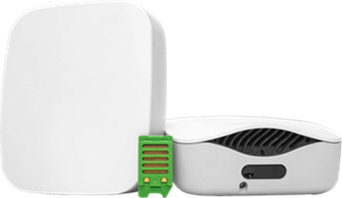
Earlier this year, FreshAir Sensor, a leading innovator in indoor air quality (IAQ) monitoring, launched FreshAir Certified, a low-cost, high-margin bookable room attribute that allows hotels to leverage air quality as an exclusive guest purchase option. The lodging industry reacted favorably with FreshAir Sensor signing up 15,000 guestrooms in the first five weeks.
While odors and lingering smells remain a common guest complaint, hoteliers are often challenged to pre-empt any complaints before they arise. FreshAir Certified addresses these challenges by enabling hotels to offer guestrooms with scientifically verified, high-quality indoor air, meeting the growing demand for personalized, wellness-focused accommodations while creating a new revenue stream.
FreshAir Sensor’s molecular air quality monitoring solutions are installed directly in the hotel guestroom to track and certify rooms that are free of common irritants (including odors from unauthorized smoking of tobacco and marijuana, scented sprays, and conditions for mold). The sensor can interact with smart thermostats to turn on the HVAC system and bring outside air in. This helps mitigate the conditions favorable for mold.
“The number one guest complaint today is poor indoor air quality,” says Will Darrah, Chief Commercial Officer at FreshAir Sensor. “The industry is not talking enough about IAQ and odors.”
A Low-Cost Enhancement
Operators can offer FreshAir Certified rooms to guests as part of their booking journey as a low-cost enhancement—typically around $10 per night according to Darrah, adding that the monetization model is still in its early stages.
By introducing FreshAir Certified as a bookable enhancement, hotels can meet evolving guest expectations, increase TRevPAR, and reinforce their commitment to exceptional indoor environments—all without additional labor or operational changes.
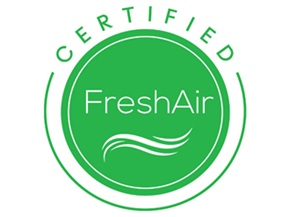
In a press release about FreshAir Certified, Darrah said, “FreshAir Certified turns air quality into a valuable, revenue-generating amenity for hotels. Through our Certification program, hotels can monetize their air quality, elevate the guest experience, and unlock new profits—without the need to spend CapEx money or take up valuable staff time or resources.”
How It Works
The FreshAir Certified program utilizes FreshAir Sensor’s patented molecular technology to provide hoteliers with a real-time inventory of rooms with verified indoor air quality standards. These rooms can then be offered to guests in the booking flow, in pre-stay communications, or at check-in at a small incremental cost.
As part of the certification process, each room is:
- Continuously monitored to ensure the highest quality air—free of common air quality contaminants, such as lingering odors from unauthorized smoking of tobacco and marijuana, scented sprays, chemical cleaners, VOCs and conditions for mold.
- Verified to be of the highest air quality for at least 60 days prior to check-in—enabling hotels to sell guaranteed air quality upgrades to guests with sensitivities, differentiating their properties in a competitive marketplace—and generating ancillary revenues with each booking.
Sensors are easy to install. They reside behind a tamperproof faceplate in the wall.
“You can scale this up to every room in the hotel,” Darrah says.
If smoking occurs in the guestroom, an e-mail alert is sent within 12 to 15 minutes. The FreshAir Sensor app also displays an alert. Proof of violation is scientifically proven, time-stamped, and the hotel can collect its fine for policy violation. Depending on the tier of hotel, cleaning and bringing a smoked-in room up to standards can cost anywhere from $700 to more than one thousand dollars, Darrah says.
Guests are informed they are staying in a room with FreshAir sensors. “This is not a gotcha business,” Darrah says, adding that there has been zero guest pushback or complaints.
FreshAir Sensor interfaces seamlessly with existing PMS, housekeeping, keylock, and guest messaging applications—Amadeus, Actabl/Alice, or OpsTechPro for example—automating air quality management processes and reducing burdens on staff.
Seven Steps to a Pure Hotel Room
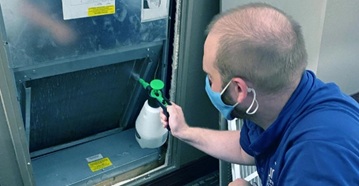
Pure Wellness offers a Pure Hotel Room program that involves a seven-step process. First, a guestroom is given an ozone shock treatment to eliminate bacteria, viruses and germs—as well as the odors they create. Second, the in-room air handling unit is deep cleaned, disinfected and sanitized. Third, all soft and hard surfaces are deep cleaned and sanitized with a plant-based cleaning agent. Fourth, a bacteriostatic barrier is sprayed on every surface that prevents allergy-triggering microorganisms from growing. Fifth, medical-grade air purifiers clean the air four times every hour, removing 99.99 percent of all airborne viruses, bacteria and other ultrafine particles. Sixth, an antimicrobial tea tree oil cartridge placed in the in-room air handling unit maintains cleanliness, fights bacteria and emits a subtle, fresh scent. Seventh, a hypoallergenic mattress protector and pillow encasements are installed, providing protection from dust and dust mites.
Haley Payne, Chief Commercial Officer, Pure Wellness, says there are now 225 hotels with just under 3,000 Pure Hotel Rooms. Most major brands are represented. Hotels typically convert about 10 to 15 percent of room inventory into Pure Hotel Rooms. “Sometimes they will do an entire floor,” Payne says. “It becomes their Wellness Floor.” Pure Wellness has helped provide guests with 6.5 million restful nights.
Hotels generally charge about $20 to $25 per night for the Pure Hotel Room upgrade. A luxury hotel may charge much more—up to $150 per night, Payne says. Travelers can opt for the Pure Hotel Room type at the point of reservation or at check-in. Pure Hotel Rooms are indicated as such in signage just above the room number. There is a certificate within the room and the Pure Wellness logo is also on the air purifier.
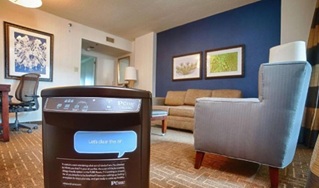
Payne says that early on, the approximately 20-year-old company focused on air quality for allergy sufferers in its messaging. That expanded to wellness and then today to a quality night’s sleep.
“As brands focus more on wellness, we have seen a lot more interest in indoor air quality,” Payne says. She adds that as hotels welcome more pets, more travelers require a guestroom free of allergens or smells.
Pure Wellness tests for air particulates in each Pure Hotel Room to determine its readiness for guest visitation. Pure Hotel Rooms undergo a maintenance check every six months. The bacteriostatic barrier can last two years.
Delos Living & Stay Well Rooms
Delos Living’s Stay Well Rooms have been installed in over 20 hotel brands and properties, with thousands of guestrooms deployed globally across independent hotels and major hospitality groups.
Within the Stay Well Rooms program, different room package options include a focus on improving IAQ. One such option includes Advanced Air Purification as a standalone upgrade.
“Some hotels do charge a premium for these enhanced rooms, depending on brand positioning and tier,” the company says. “The rooms may be marketed as ‘Stay Well,’ ‘Wellness,’ or ‘Air Purified’ rooms, and pricing varies—typically a $20 to $60 premium per night.
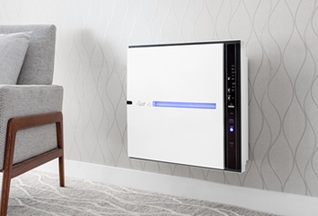
Providing a higher level of IAQ to guests is smart, Delos Living says. “Hotel rooms are often sealed environments with limited ventilation, making them vulnerable to indoor air pollutants like VOCs, allergens, and particulates. Guests increasingly expect healthier environments—especially after the pandemic—and air quality is directly linked to sleep, energy, and overall wellbeing. Clean air is no longer a luxury; it’s a guest expectation.”
Three Tiers to Choose From
In addition to offering Advanced Air Purification as a standalone upgrade, Delos Living offers three tiers of its Stay Well Rooms program that each include improving IAQ as a focus.
1. Stay Well Rooms. Core wellness features include advanced air purification, chlorine-reducing shower infuser, circadian lighting, and wellness content access.
2. Stay Well Fresh. Includes everything in Stay Well, plus enhanced scent control, additional cleaning protocols, and optional HEPA vacuum integration.
3. Stay Well Premier. Includes all previous features plus real-time air quality monitoring, UV-C cleaning tech, and dedicated wellness concierge content.
Hotels may adjust pricing by tier—typically with a $10 to $20 increase per tier, depending on location and brand.
Guests can opt in to the Stay Well Rooms program during online booking (via branded room categories), mobile check-in apps, front desk upgrades upon arrival, and some brands promote Stay Well upsells in loyalty platforms and pre-arrival emails.
Marketing Support
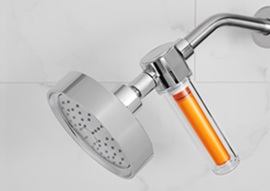
Delos Living provides marketing support that includes co-branded digital and print collateral, on-property signage and room key cards, video and web content explaining features, staff training materials, in-room marketing (tent cards, tablet integrations), and PR and press release support for launch.
The number of rooms converted to Stay Well Rooms varies by property, but most hotels dedicate an entire floor or 5 to 15 percent of rooms. This ensures operational efficiency and brand consistency while testing wellness demand.
According to Delos Living, the response to the different programs has been overwhelmingly positive. Guests consistently report improved sleep, fresher-smelling rooms, greater peace of mind, and hotels often see higher satisfaction scores, repeat bookings, and willingness to pay a premium. Brands that focus on wellness, lifestyle, luxury, or health-conscious travelers see the strongest performance.
Glenn Hasek can be reached at greenlodgingnews@gmail.com.






